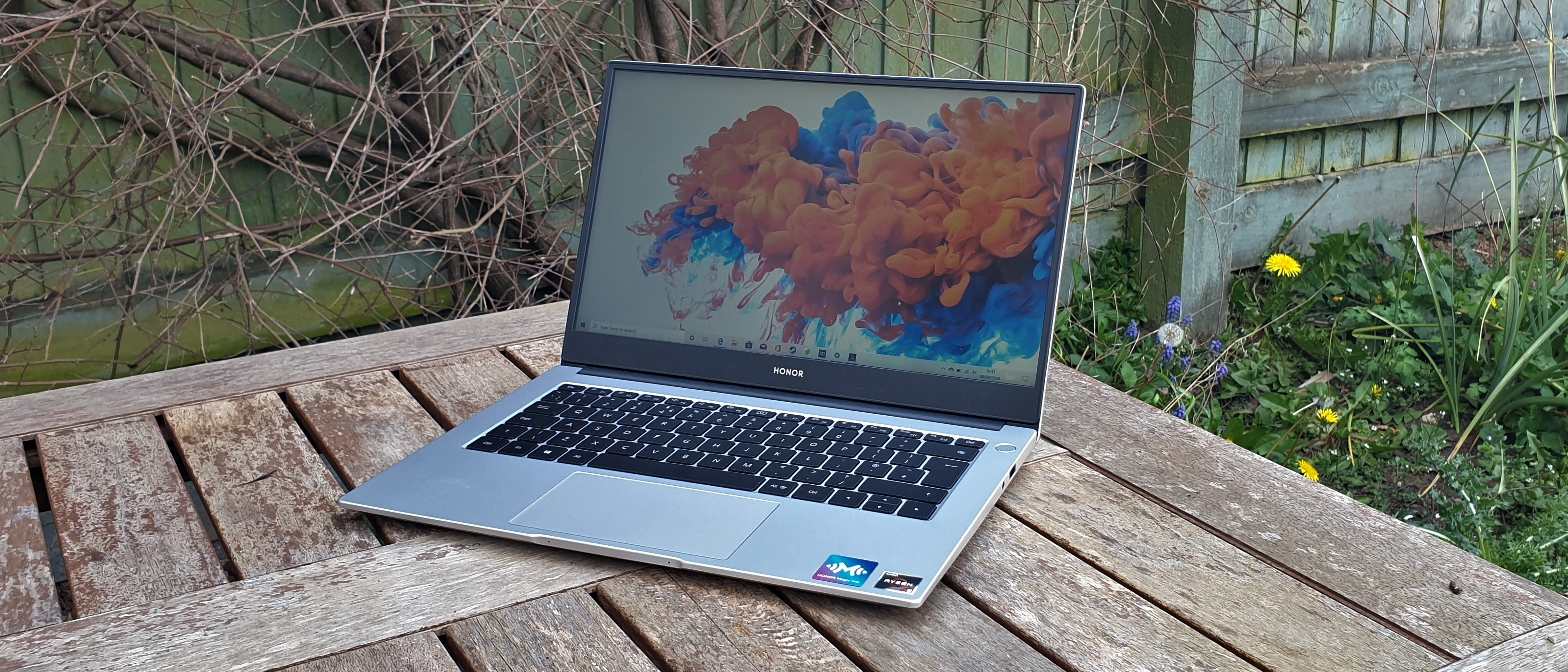TechRadar Verdict
The Honor MagicBook 14 is a decent affordable laptop that comes with a nice design, and some interesting features, but its performance is lacking. While it's an OK laptop for day-to-day use, it will struggle with anything more intense, and means you might be better off going for a Chromebook instead.
Pros
- +
Good price
- +
Nice design
- +
Decent speakers
Cons
- -
Underpowered
- -
Dim screen
- -
Its best feature is tied to Honor smartphones
Why you can trust TechRadar
Two-minute review
The Honor MagicBook 14 is the latest laptop from a Chinese manufacturer which is best known for making smartphones. Like Huawei, its parent company, and its MateBook D 15 laptop, the Honor MagicBook 14 aims to redefine what we’ve come to expect from mid-range laptops.
That’s a pretty ambitious goal, and while we felt that the Huawei MateBook D 15 did some things right – like bringing a premium design to an affordable laptop – it wasn’t completely successful, with battery life and screen quality being our biggest complaints. But, can Honor succeed where Huawei failed, and really make a mid-range laptop that can challenge its more established (and expensive) rivals?
Unfortunately, the answer is no. When it comes to price, it’s certainly competitive, and is available in the UK and Europe for £549.99 (around $670, AU$1,100). US and Australian readers will miss out, however.
It’s a tempting price for a Windows 10 laptop with 8GB of RAM, though the specs elsewhere are a little underwhelming. For day to day use it’s fine, if sometimes a little slow, but don’t expect its AMD Ryzen 5 3500U processor to be able to handle demanding tasks or gaming.
Its design is pretty nice, however, and helps make the Honor MagicBook 14 look more expensive than it is. There’s a decent array of ports, with a mix of new USB-C and older USB-A, so you shouldn’t struggle to plug in your components.
Like the MateBook D 15, which it shares some similar design elements with, the MagicBook 14’s webcam is built into the keyboard, allowing you to easily cover it when not in use. It’s a nice security feature, but some people might not be too fond of the angle the webcam is positioned in, which can capture some unflattering ‘up nostril’ shots.
When it comes to the screen, the 1080p resolution is fine, but the maximum brightness is a bit too low for our tastes, which means the display lacks the vibrancy found in other laptops. It’s a shame, as the Dolby Atmos-certified speakers are some of the better ones we’ve heard in a budget laptop.
Sign up for breaking news, reviews, opinion, top tech deals, and more.
Overall, the Honor MagicBook 14 is a decent affordable laptop that offers some nice features, and a premium design, for a very compelling price. However, performance isn’t great, and many people may find a Chromebook to be a better alternative.
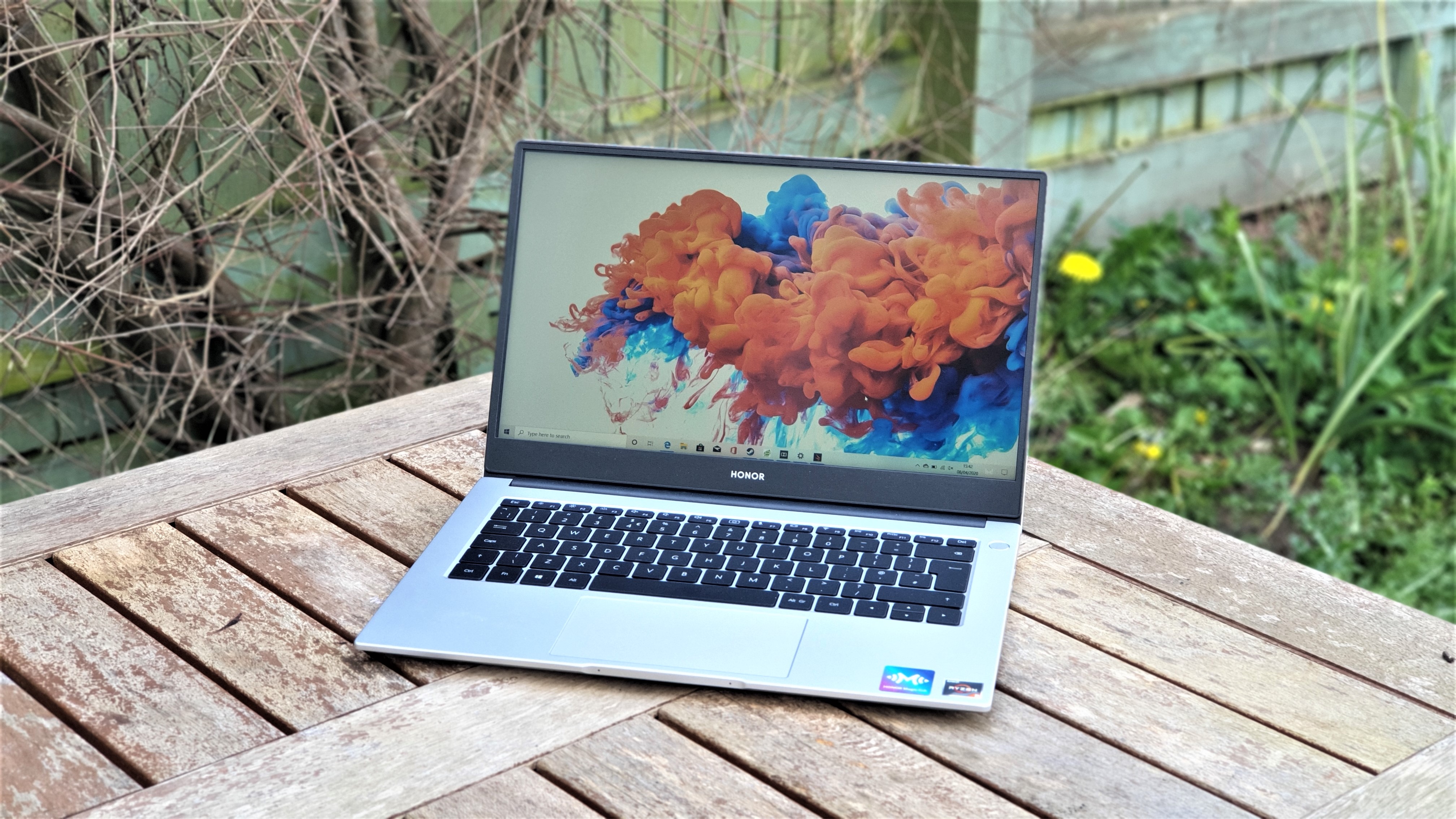
Here is the Honor MagicBook 14 configuration sent to TechRadar for review:
CPU: 2.1GHz AMD Ryzen 5 Mobile 3500U (quad-core, 4MB cache, up to 3.7GHz)
Graphics: AMD Radeon Vega 8 (8-core, 1,200MHz)
RAM: 8GB DDR4 (2,400MHz)
Screen: 14-inch, FHD (1,920 x 1,080)
Storage: 256GB SSD
Ports: 1 x USB Type-C, 1 x USB 3.0, 1 x USB 2.0, 1 x HDMI, 1 x 3.5mm headphone jack
Connectivity: 802.11ac (2x2 MIMO), Bluetooth 5
Camera: 1MP webcam
Weight: 3.04 pounds (1.38kg)
Size: 12.7 x 8.6 x 0.63 inches (322.5 x 214.8 x 15.9mm; W x D x H)
Price and availability
The Honor MagicBook 14 is on sale in the UK with prices starting at £549.99 (around $670, AU$1,100) . This model comes with an AMD Ryzen 5 3500U processor, 8GB DDR4 and 256GB SSD.
This follows a global launch earlier in 2020 for the Honor laptop. As with devices from its parent company, Huawei, while they are easily bought in Asia, and especially their native China, they are not always available elsewhere in the world.
While Honor has made much of the global launch of the MagicBook 14, it doesn’t seem to be available in certain countries, like the US.
It seems like there could be a model with an Intel processor as well, but we are having trouble finding information on it. We’ve contacted Honor for clarity.
If you do find yourself in a country that sells the Honor MagicBook 14, then that price tag is particularly appealing, undercutting a number of its competitors by quite a margin.
The similarly-specced Huawei MateBook D 15 costs slightly more at £599.99 (around $780, AU$1,200). This comes with the same AMD Ryzen 5 3500U processor, 8GB RAM and 256GB storage, but with a larger 15-inch display.
There’s also the 14-inch Huawei MateBook D 14, which comes with a 512GB SSD, and costs even more at £649.99 (around $800, AU$1,300).
Is double the storage space worth that extra £100? We’d argue it is, as these days 256GB is a rather paltry amount for a laptop, and once Windows 10 and various apps are installed, it doesn’t give you a lot of space left.
However, we can’t argue that at £549.99, the Honor MagicBook 14 offers a very tempting price, and while the AMD Ryzen 5 3500U is not the newest, or most powerful, CPU, you’re getting 8GB of RAM. We’d argue that’s now the minimum amount of memory you’d want for a Windows 10 laptop. All too often, we’re still seeing budget laptops trying to get away with 4GB.
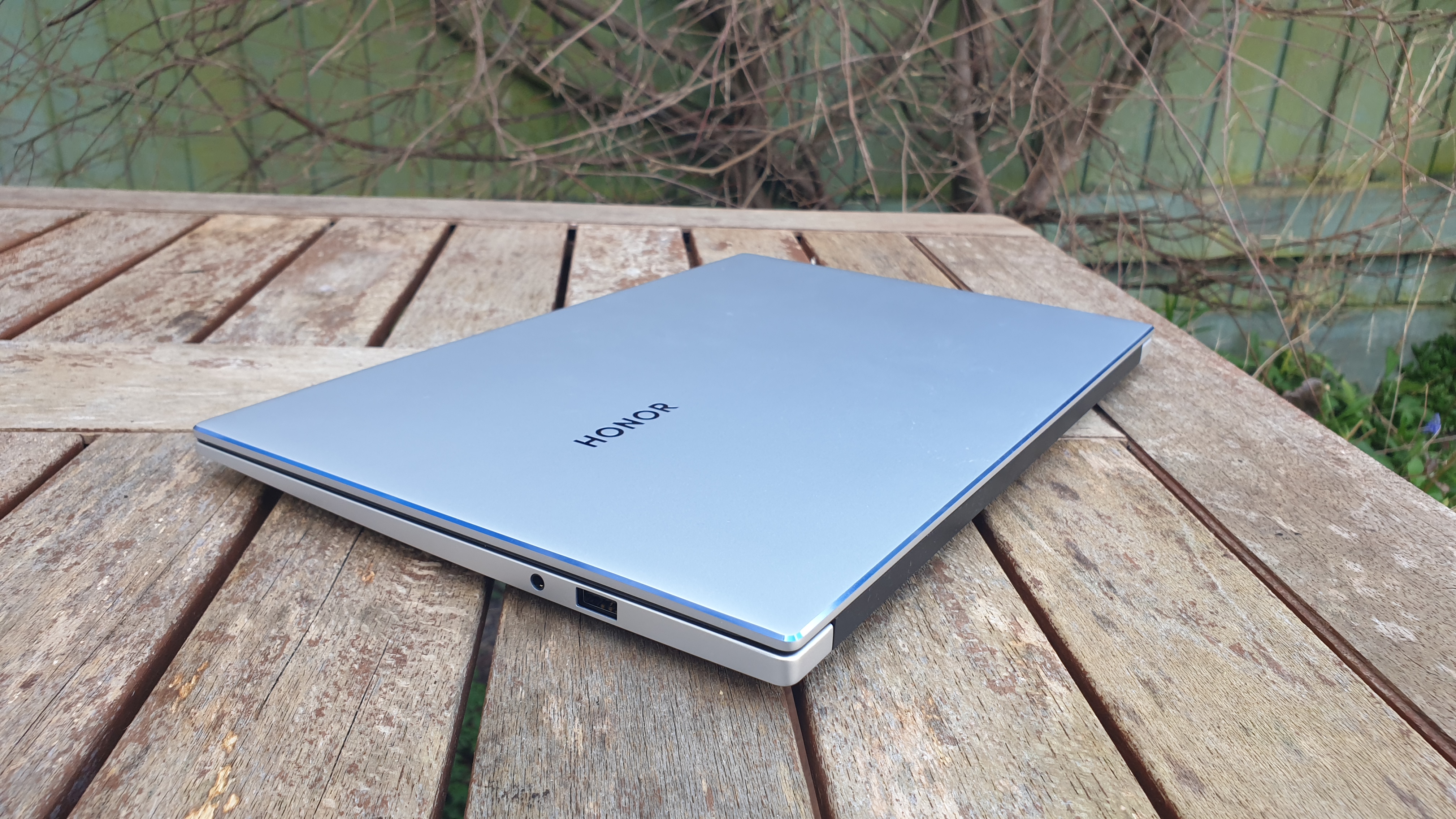
Design
While the Huawei MateBook D takes some very obvious design cues from Apple, the Honor MagicBook 14 does more of its own thing… on the outside, at least.
The body has a metallic finish in “Mystic Silver” or “Space Gray” that helps make the Honor MagicBook 14 look more expensive than it is. Along the edges of the screen is a subtle blue metallic finish, and when that catches the light, it produces a pleasing effect that sets the laptop apart from all-grey laptops that are often found at this price.
The Honor logo also sits off-centre and slightly to the left on the back of the display. Again, it looks rather nice, and many people will appreciate the minimalist design.
Size-wise, the Honor MagicBook 14 has dimensions of 214.8 x 322.5 x 15.9mm and a weight of 1.38kg. So, this isn’t the thinnest – or lightest – laptop in the world, but it’s not particularly bulky, either.
Sure, it can't compete with the lightweight laptop champs like the LG Gram or the MacBook Air, but remember this is a much cheaper laptop.
On the right-hand side of the body there’s a USB Type A port and audio jack, while on the right there is a second standard USB port, a USB Type-C port and HDMI port as well.
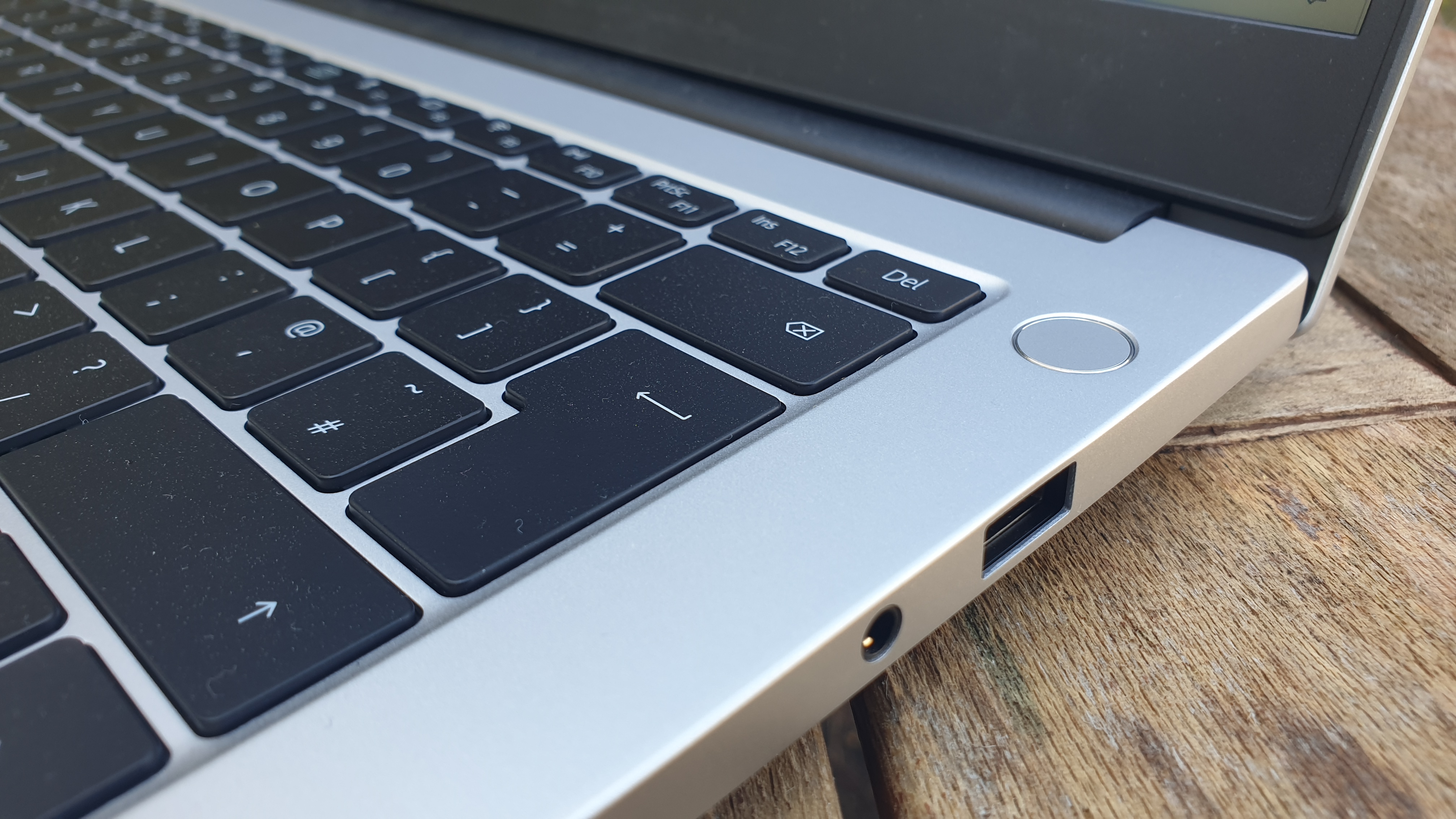
That’s not an awful selection of ports, and the mix of older USB Type A and newer USB Type-C ports means you should be able to easily plug in your peripherals no matter what their age is without needing to mess around with a dongle.
It’s worth noting, however, that the USB-C port is also used for charging. On the one hand, this is useful as it means you can plug in most USB-C chargers to top up the battery without having to rely on a proprietary charger, but on the other hand, it means while you’re charging you won’t be able to use the USB-C port for anything else.
While the Honor MagicBook 14 does a good job of standing out on its own when closed, it’s a slightly different experience when you open it up. Anyone who’s seen or used the Huawei MateBook D, or the MacBook it heavily cribs from, then you’ll be faced with a very familiar looking keyboard.
In our MateBook D review we noted how similar the keyboard was to the MacBook, and with the Honor MagicBook 14 having an identical keyboard to Huawei’s laptop, the same applies here.
It really does look uncannily like a MacBook keyboard – so much so, in fact, that Apple’s lawyers may take a rather keen interest in it.
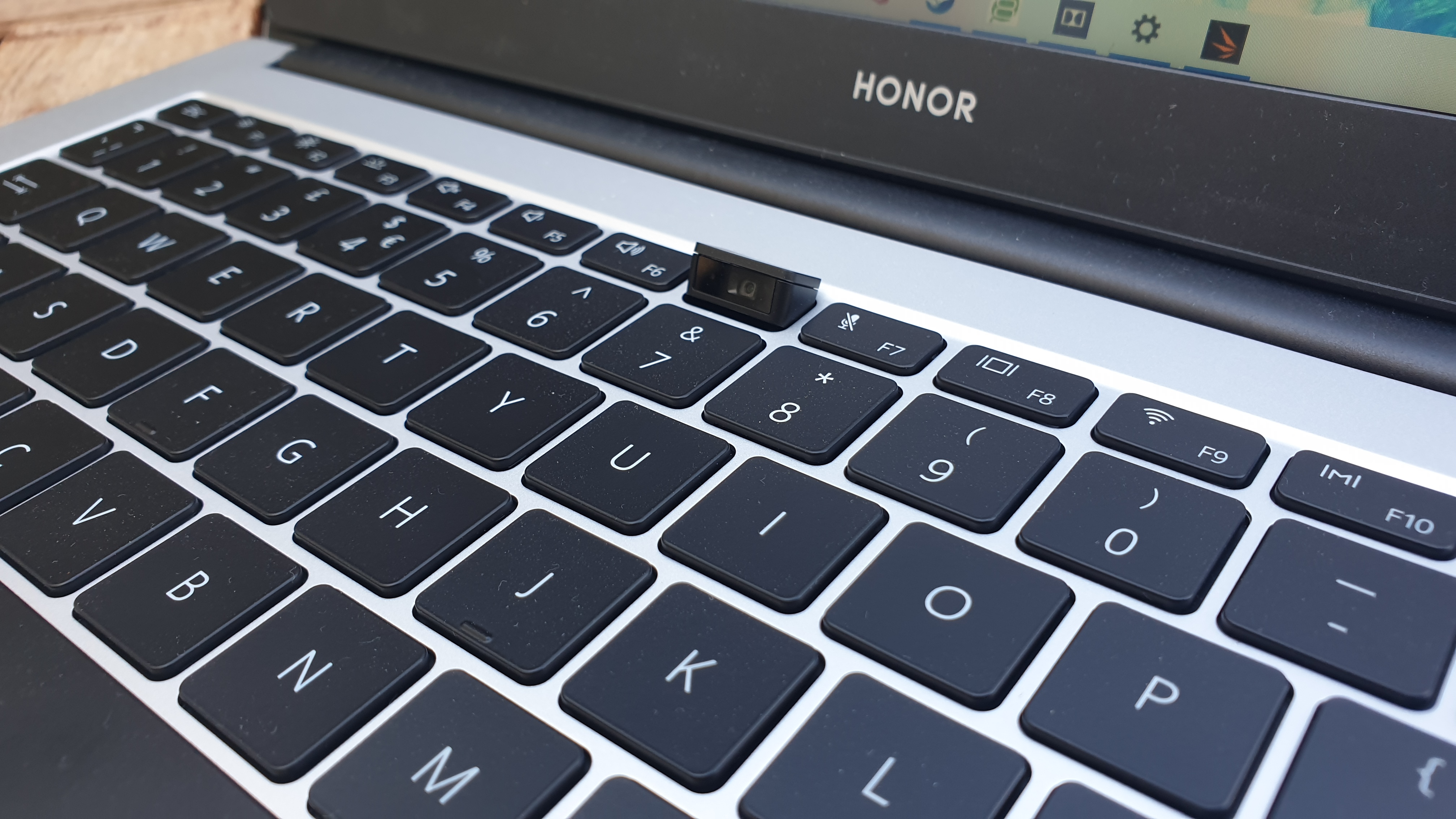
There’s no Touch Bar-like second screen above the keyboard, but as with the MateBook D, the power button to the far-right of the keyboard also acts as a fingerprint scanner for biometric login to Windows 10.
The Honor Magic Book 14 also takes another of our favourite features of the MateBook D, with the webcam built into the keyboard. Pressing the key with the camera symbol, which is nestled between the F6 and F7 keys, and the webcam pops up. It’s a rather elegant way of making sure your webcam is secure when not in use. All you do is pop it back into the recess in the keyboard, and it effectively turns off the webcam, so you don’t have to worry about malicious users hijacking the webcam.
There are some side effects to the placement of the webcam in the keyboard, some welcome, some… not so. On the plus side, moving the webcam from its traditional spot in the top bezel above the screen has allowed Honor to surround the 14-inch screen with impressively-thin bezels – the company claims a screen to body ratio of 84%.
This means the overall size of the laptop can be kept down, and it also gives the Honor MagicBook 14 a modern look and feel.
Less welcome is the fact that with the webcam at the bottom of the laptop looking up, it can result in some rather unflattering camera angles. Having a webcam at the top of the screen, where you can look directly at it, is a more natural experience for many people.
The screen itself is a 1080p affair, which at 14-inches offers a decent level of sharpness and clarity. It’s not that bright, however, and in direct sunlight you’ll likely find it a bit too dim and washed-out to use comfortably.
Overall, the Honor MagicBook 14’s design is roughly what you’d expect for a laptop at this price range. It’s not the thinnest or lightest, but it has a modern design with a few nice touches.
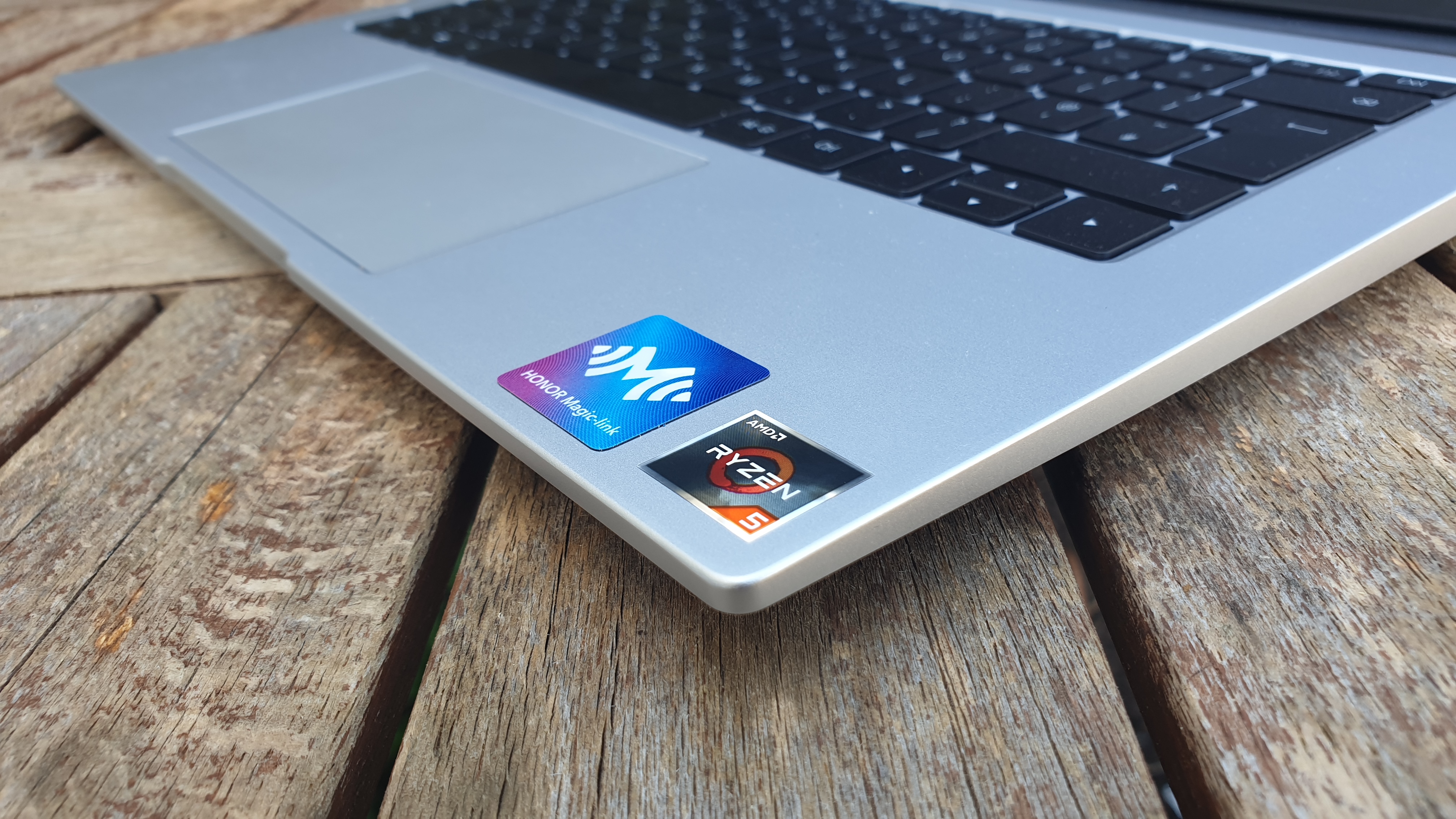
Here’s how the Honor MagicBook 14 performed in our suite of benchmark tests:
3DMark Sky Diver: 8,318; Fire Strike: 2,374; Time Spy: 849
Cinebench R20 CPU: 1,355 points
GeekBench 5: 694 (single-core); 2,875 (multi-core)
PCMark 8 (Home Test): 3,016 points
PCMark 8 Battery Life: 4 hours 3 minutes
Battery Life (TechRadar movie test): 7 hours and 6 minutes
Performance
On paper, the specs of the Honor MagicBook 14 aren’t that bad at all. The 8GB of RAM is certainly welcome, and helps Windows 10 feel responsive during day-to-day tasks.
What those day-to-day tasks entail, however, is crucial. This is because the AMD Ryzen 5 3500U processor isn’t all that powerful, so you’re going to have to temper your expectations for what this laptop is capable of.
Web browsing, word processing and a spot of light photo editing can all be done without causing the Honor MagicBook 14 too much trouble, but anything more intensive than that will be an exercise in frustration. We did notice on particularly busy websites, for instance, that there are sometimes noticeable pauses as the page loads, something more powerful laptops don’t experience.
The AMD Ryzen 5 3500U processor comes with integrated Radeon Vega 8 graphics – but, again, you’ll need to be realistic about what you want to use this laptop for. It won’t be enough to run all but the most basic games, for example.
For a Windows 10 laptop of this price point, the kind of performance we’re seeing with the MagicBook 14 is pretty much expected, and for many people will be absolutely fine.
However, if you’re going to be restricting your laptop use to web browsing and document creating – and not much more – then you can save even more money, and get better performance in many respects – by purchasing a Chromebook instead.
When it comes to entertainment, the 1080p screen does an adequate job, but as we mentioned earlier, its low peak brightness means it lacks the vibrancy of other laptops. Audio-wise, things are better with four built-in speakers that are Dolby Atmos-certified. This addition seems a little peculiar in a laptop that otherwise doesn’t seem too concerned with media entertainment, and don’t go expecting the kind of 3D sound effects you get from expensive Dolby Atmos setups in cinemas or in home theatre setups.
But they do sound rather good, with low and high frequencies well represented. Music sounds good, as do action scenes in movies. It’s just a bit of a shame that the display can’t compete.
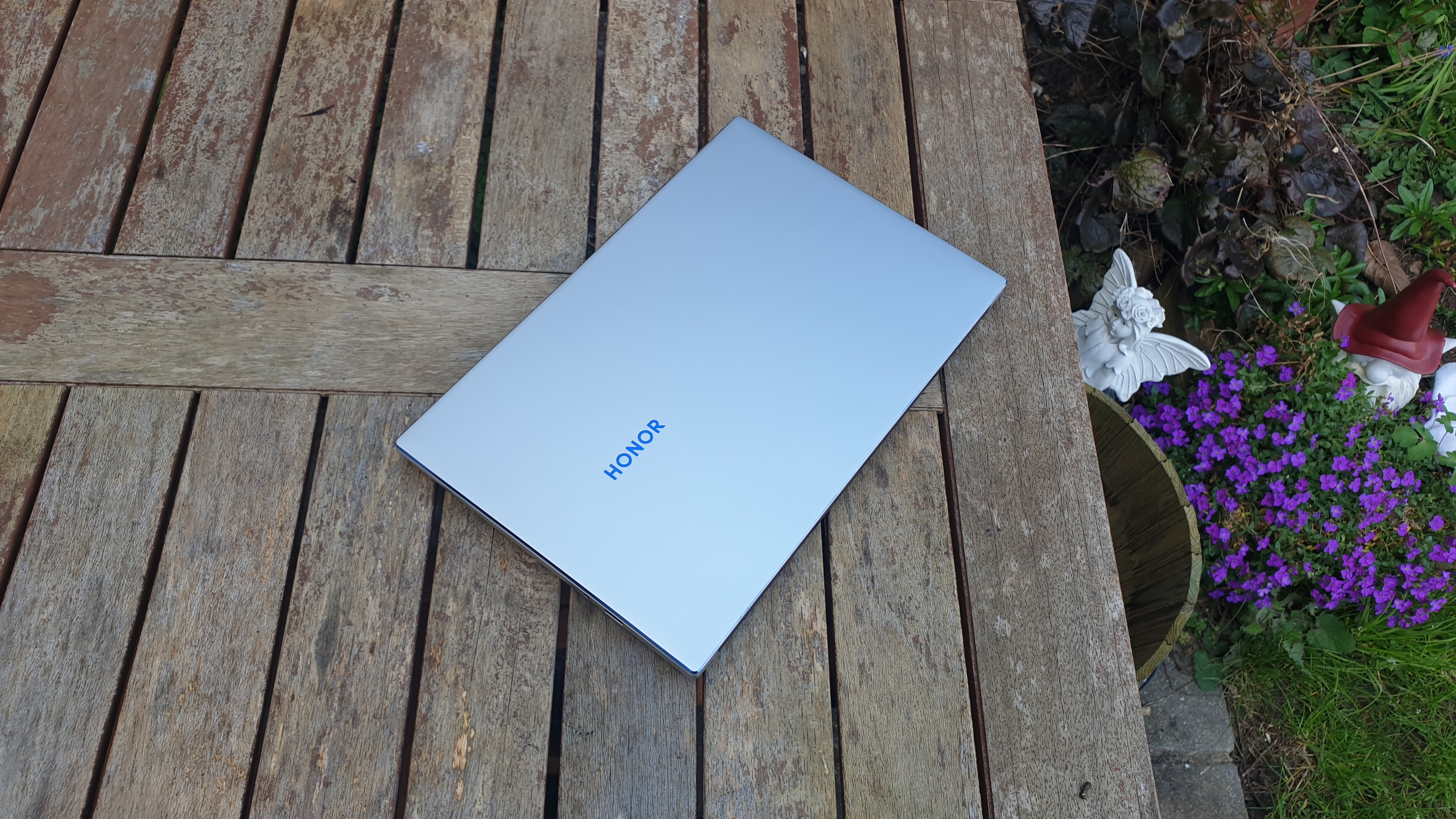
Battery life
Honor promises eight hours of battery life with the MagicBook 14, and in our own benchmark test we found it wasn’t too far off that, scoring seven hours and six minutes before turning off. This was running a looped 1080p video, which to be fair isn’t the most intensive task you’ll ask of a laptop.
Still, it means you should get through a school day or long flight on a single charge – as long as you don’t do too much on the laptop.
For more intensive tasks, however, the battery drops… dramatically. The PC Mark 8 battery test, which replicates moderate use, such as video calling and document creation, drained the battery in just four hours.
Meanwhile, in our day-to-day use, we found battery life fell midway between the two, at around five hours. Not bad, but not great, either. You’ll want to keep the charger close by, is what we’re saying. Luckily, as we mentioned earlier, the MagicBook 14 uses its USB-C port to charge, so you can borrow the chargers of other laptops – we once used a MacBook’s charger – to top the laptop up.
The battery also charges up impressively fast as well, which makes up for the shorter battery life.
Software and features
The Honor MagicBook 14 comes with Windows 10 Home and it’s thankfully rather light of bloatware. There is a prominent app that pops up called ‘PC Manager’. This gives you an overview of the general health of the laptop, and highlights drivers that need updating.
The app is OK, though advanced users won’t really need it – it doesn’t tell you anything you wouldn’t know from checking Windows 10’s built-in tools like Task Manager – but it’s not too obtrusive, and it’s nicely designed. We’ve seen worse pre-installed apps.
There’s also a ‘My Phone’ section, but that requires an Honor smartphone to work. Great if you have one, but a shame it’s not cross platform.
Which leads us to one of the MagicBook 14’s potentially best features – the Honor Magic-link. This is an NFC sticker that lets you connect a phone to the laptop by simply tapping the phone on the sticker. This pops up an app that displays the screen of the smartphone, and lets you easily drag and drop files between laptop and computer.
It’s essentially exactly the same feature as the Huawei Share feature on the MateBook D – with the same drawbacks. While, it’s potentially very useful, it’s again only compatible with certain Honor smartphones (and Huawei ones, similarly to how Huawei Share works with Honor phones).
So, if you already have a compatible Honor or Huawei phone, it’s a great feature, but useless to anyone who doesn’t own a handset. While it might make you consider switching next time you upgrade, it’s not quite enough to ditch an iPhone or a Samsung.
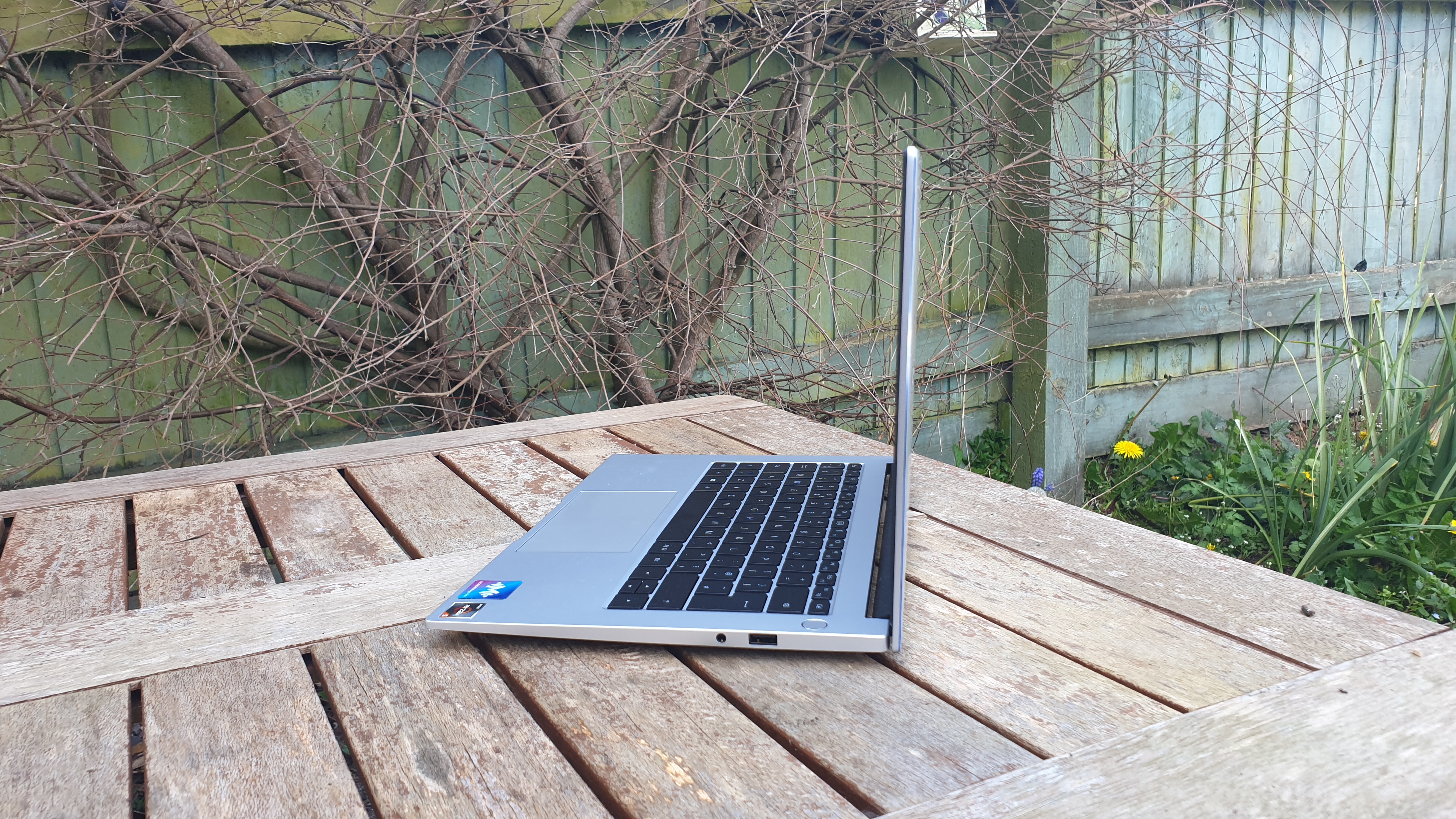
Buy it if...
You want an affordable Windows 10 laptop that doesn’t look cheap
The Honor MagicBook 14 comes at a compelling price, but its design feels premium. The thin bezels around the screen, and aluminium body, makes this laptop look and feel more expensive than it is.
You have an Honor smartphone
One of the Honor MagicBook 14’s best features is the Honor Magic-link NFC sticker that lets you quickly and easily connect an Honor smartphone to the laptop. If you have one and are looking for a new laptop, then this makes the MagicBook 14 a compelling purchase.
You want a cheap laptop, but not a Chromebook
The MagicBook 14 is good for web browsing, word processing and light photo editing – and not much else. This means Chromebooks are a good alternative, as they do roughly the same stuff, but cheaper still, but if you want to stick with Windows 10, this isn’t a bad choice.
Don't buy it if...
You want a powerful laptop
The Honor MagicBook 14 isn’t a great performer. For the price, it’s fine, but if you want something that opens apps in a flash and can handle games, this isn’t for you.
You want the cheapest laptop
While the Honor MagicBook 14 is certainly priced low, it’s not the cheapest laptop on the market. If you want a lower price with the same (or even better) performance, maybe check out our list of the best Chromebooks.
You want all-day battery
With day-to-day use, you’ll see around five to seven hours of battery life with the MagicBook 14. That’s not bad, but there are laptops out there which last much longer. Chromebooks, for instance, as well as a growing number of Windows 10 laptops as well.
- These are the best laptops of 2020

Matt is TechRadar's Managing Editor for Core Tech, looking after computing and mobile technology. Having written for a number of publications such as PC Plus, PC Format, T3 and Linux Format, there's no aspect of technology that Matt isn't passionate about, especially computing and PC gaming. He’s personally reviewed and used most of the laptops in our best laptops guide - and since joining TechRadar in 2014, he's reviewed over 250 laptops and computing accessories personally.
